Importance of Business Ethics: Case Studies and Ethical Theories
VerifiedAdded on 2023/06/15
|11
|2948
|490
AI Summary
This article discusses the importance of business ethics through five case studies and ethical theories such as Kantian and Utilitarian. It covers topics such as child labor, organic food production, and social media background checks. The article emphasizes the significance of ethical decision-making in the workplace.
Contribute Materials
Your contribution can guide someone’s learning journey. Share your
documents today.
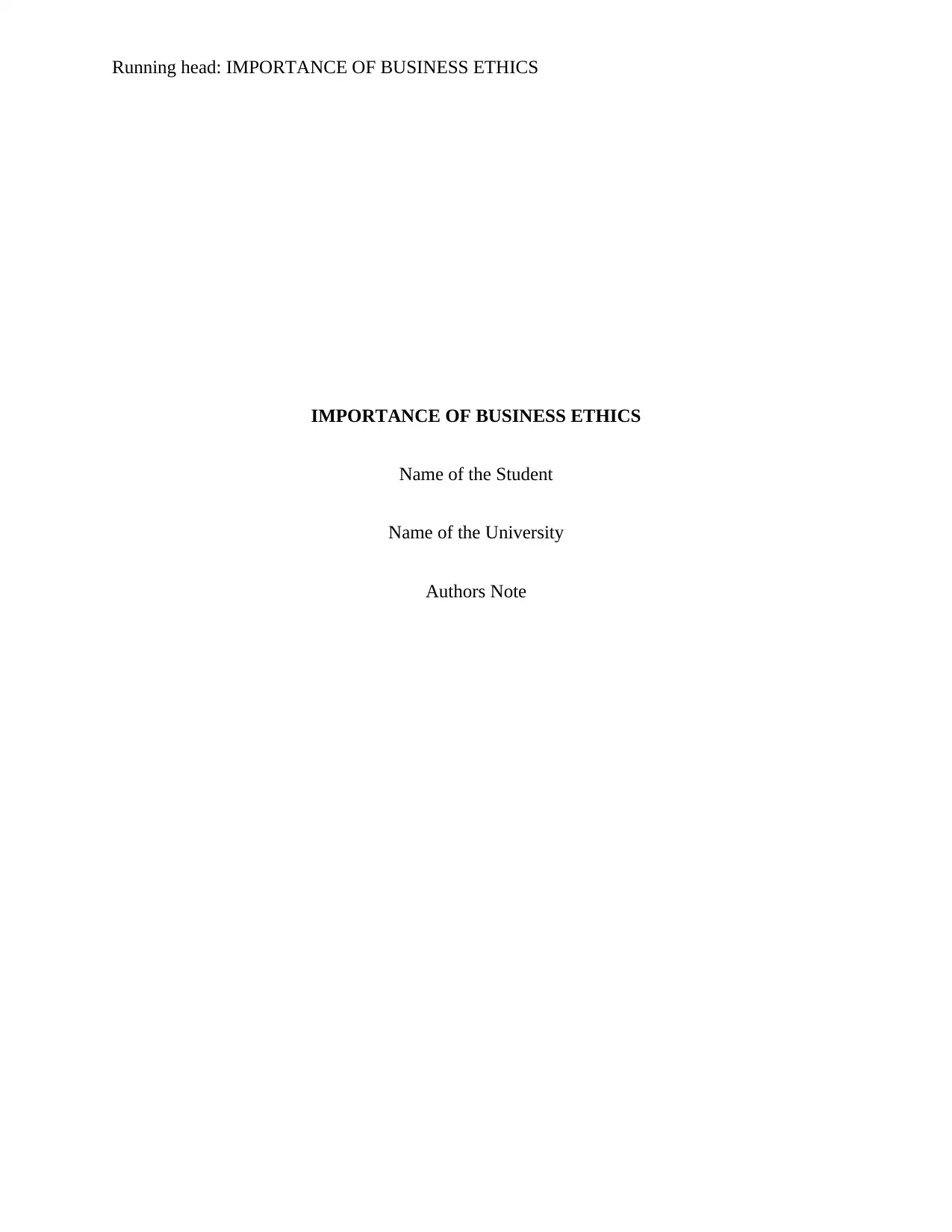
Running head: IMPORTANCE OF BUSINESS ETHICS
IMPORTANCE OF BUSINESS ETHICS
Name of the Student
Name of the University
Authors Note
IMPORTANCE OF BUSINESS ETHICS
Name of the Student
Name of the University
Authors Note
Secure Best Marks with AI Grader
Need help grading? Try our AI Grader for instant feedback on your assignments.
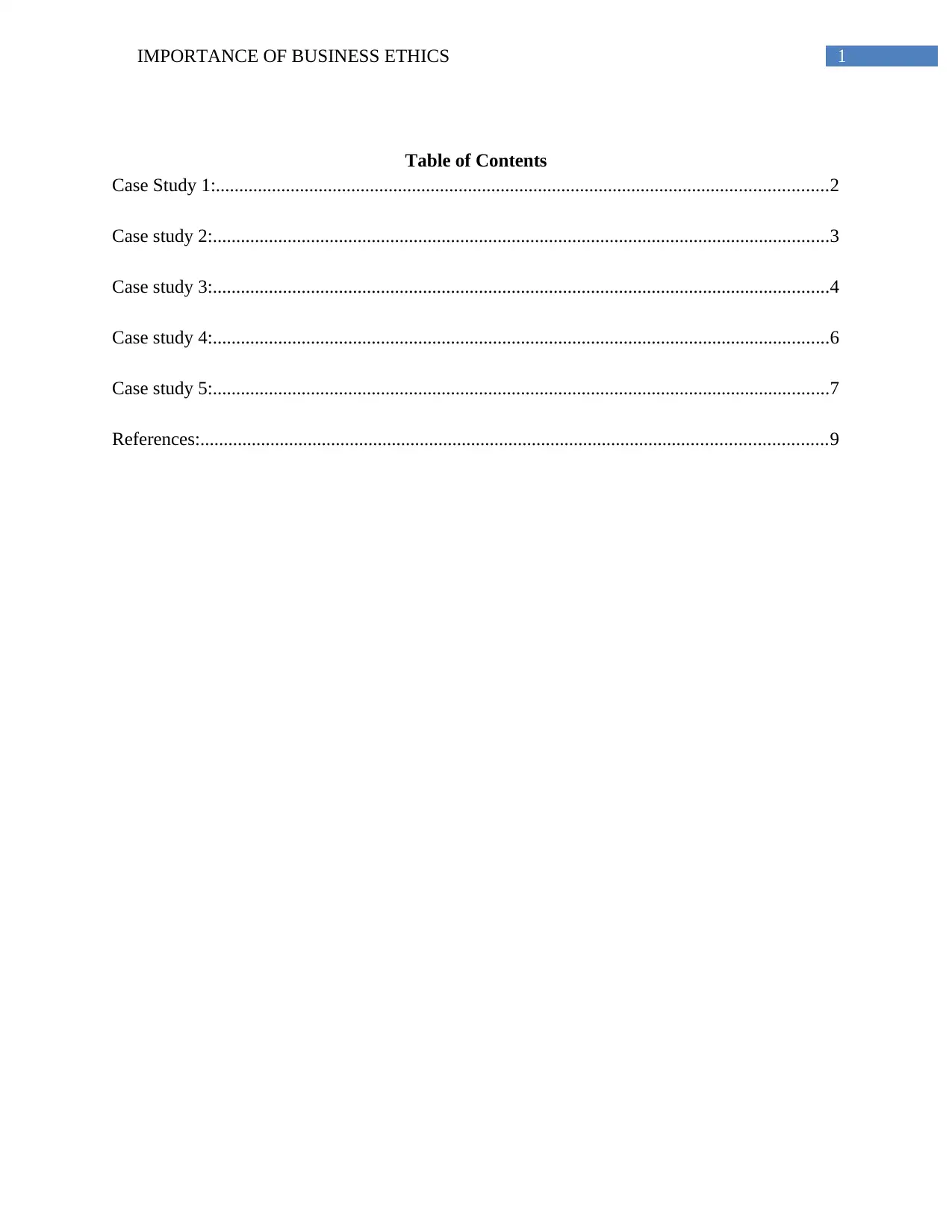
1IMPORTANCE OF BUSINESS ETHICS
Table of Contents
Case Study 1:...................................................................................................................................2
Case study 2:....................................................................................................................................3
Case study 3:....................................................................................................................................4
Case study 4:....................................................................................................................................6
Case study 5:....................................................................................................................................7
References:......................................................................................................................................9
Table of Contents
Case Study 1:...................................................................................................................................2
Case study 2:....................................................................................................................................3
Case study 3:....................................................................................................................................4
Case study 4:....................................................................................................................................6
Case study 5:....................................................................................................................................7
References:......................................................................................................................................9
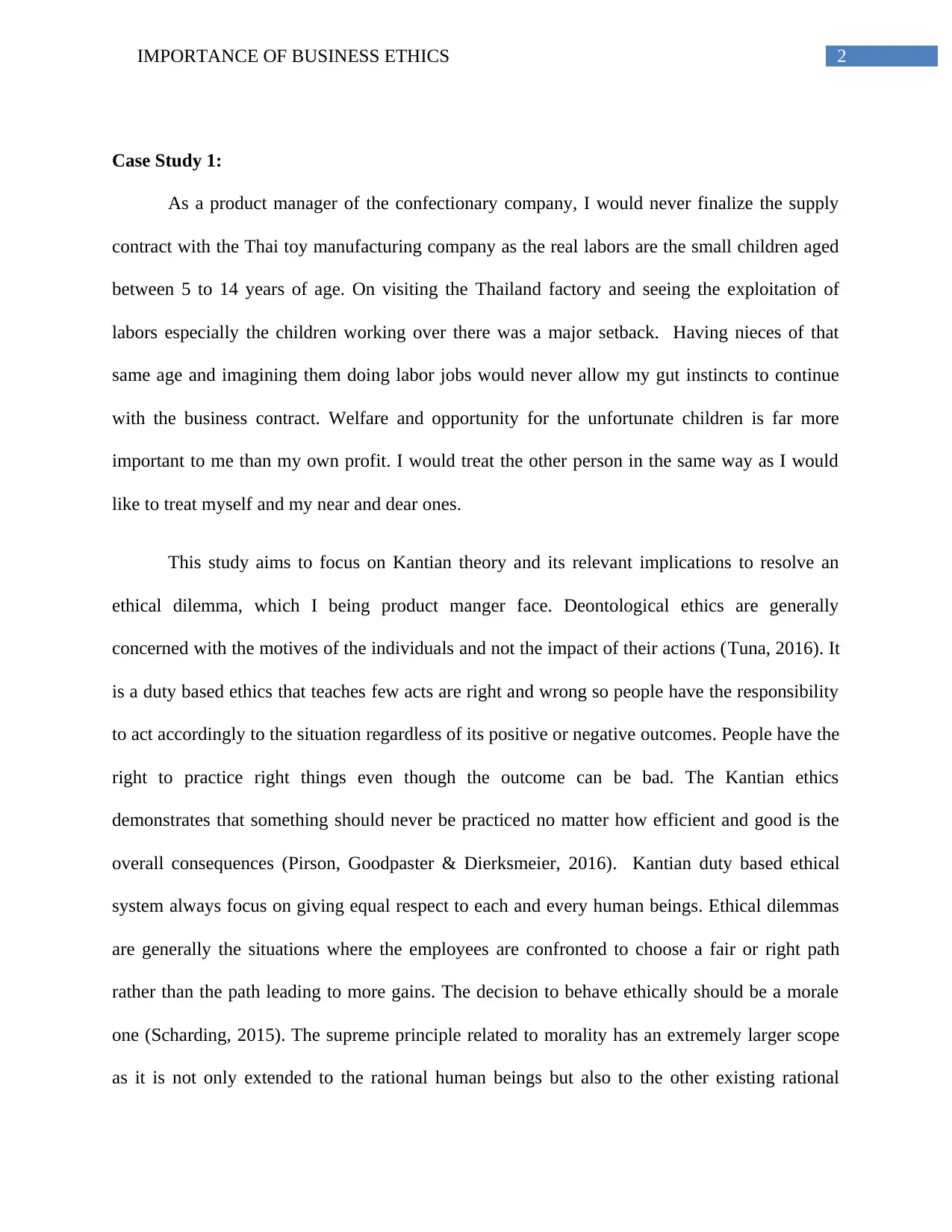
2IMPORTANCE OF BUSINESS ETHICS
Case Study 1:
As a product manager of the confectionary company, I would never finalize the supply
contract with the Thai toy manufacturing company as the real labors are the small children aged
between 5 to 14 years of age. On visiting the Thailand factory and seeing the exploitation of
labors especially the children working over there was a major setback. Having nieces of that
same age and imagining them doing labor jobs would never allow my gut instincts to continue
with the business contract. Welfare and opportunity for the unfortunate children is far more
important to me than my own profit. I would treat the other person in the same way as I would
like to treat myself and my near and dear ones.
This study aims to focus on Kantian theory and its relevant implications to resolve an
ethical dilemma, which I being product manger face. Deontological ethics are generally
concerned with the motives of the individuals and not the impact of their actions (Tuna, 2016). It
is a duty based ethics that teaches few acts are right and wrong so people have the responsibility
to act accordingly to the situation regardless of its positive or negative outcomes. People have the
right to practice right things even though the outcome can be bad. The Kantian ethics
demonstrates that something should never be practiced no matter how efficient and good is the
overall consequences (Pirson, Goodpaster & Dierksmeier, 2016). Kantian duty based ethical
system always focus on giving equal respect to each and every human beings. Ethical dilemmas
are generally the situations where the employees are confronted to choose a fair or right path
rather than the path leading to more gains. The decision to behave ethically should be a morale
one (Scharding, 2015). The supreme principle related to morality has an extremely larger scope
as it is not only extended to the rational human beings but also to the other existing rational
Case Study 1:
As a product manager of the confectionary company, I would never finalize the supply
contract with the Thai toy manufacturing company as the real labors are the small children aged
between 5 to 14 years of age. On visiting the Thailand factory and seeing the exploitation of
labors especially the children working over there was a major setback. Having nieces of that
same age and imagining them doing labor jobs would never allow my gut instincts to continue
with the business contract. Welfare and opportunity for the unfortunate children is far more
important to me than my own profit. I would treat the other person in the same way as I would
like to treat myself and my near and dear ones.
This study aims to focus on Kantian theory and its relevant implications to resolve an
ethical dilemma, which I being product manger face. Deontological ethics are generally
concerned with the motives of the individuals and not the impact of their actions (Tuna, 2016). It
is a duty based ethics that teaches few acts are right and wrong so people have the responsibility
to act accordingly to the situation regardless of its positive or negative outcomes. People have the
right to practice right things even though the outcome can be bad. The Kantian ethics
demonstrates that something should never be practiced no matter how efficient and good is the
overall consequences (Pirson, Goodpaster & Dierksmeier, 2016). Kantian duty based ethical
system always focus on giving equal respect to each and every human beings. Ethical dilemmas
are generally the situations where the employees are confronted to choose a fair or right path
rather than the path leading to more gains. The decision to behave ethically should be a morale
one (Scharding, 2015). The supreme principle related to morality has an extremely larger scope
as it is not only extended to the rational human beings but also to the other existing rational
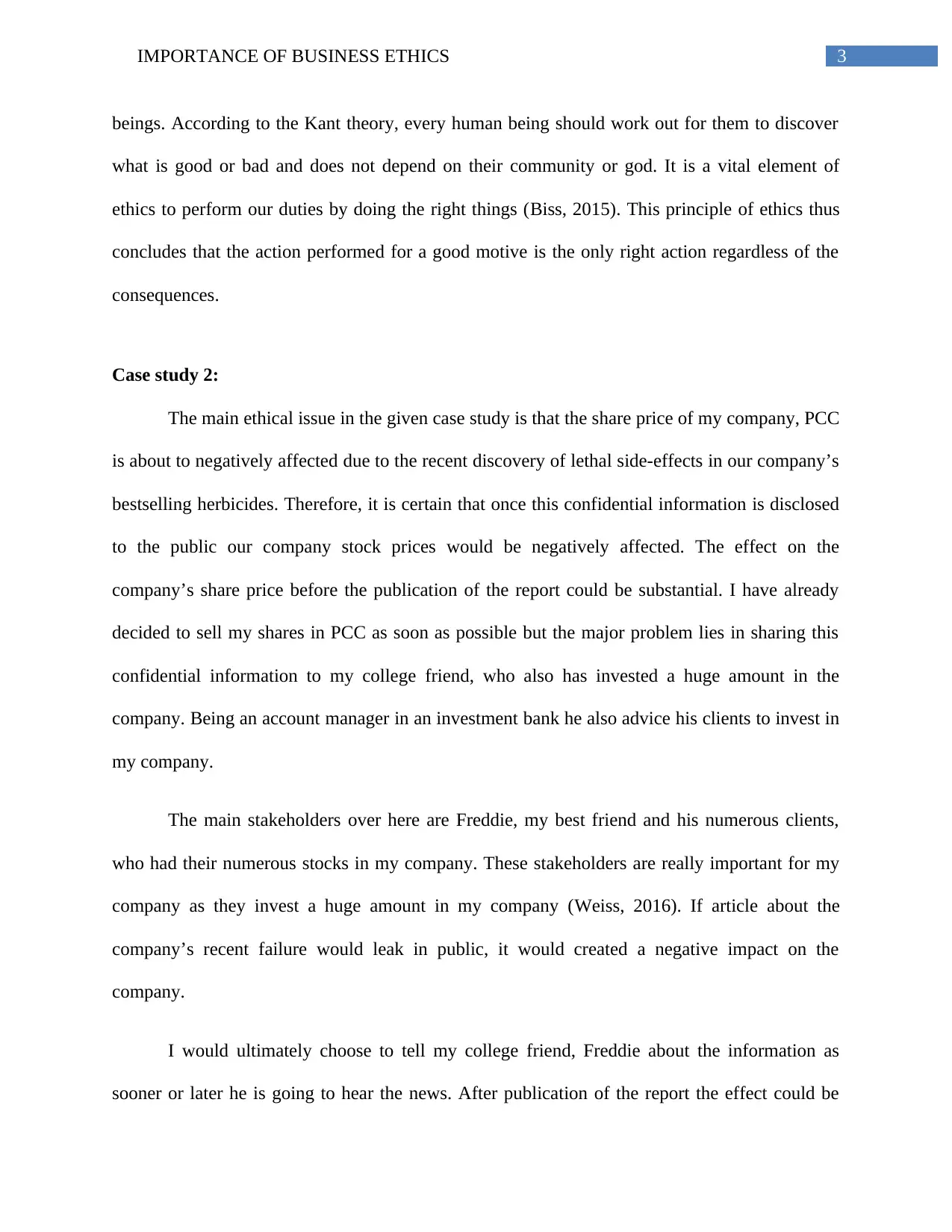
3IMPORTANCE OF BUSINESS ETHICS
beings. According to the Kant theory, every human being should work out for them to discover
what is good or bad and does not depend on their community or god. It is a vital element of
ethics to perform our duties by doing the right things (Biss, 2015). This principle of ethics thus
concludes that the action performed for a good motive is the only right action regardless of the
consequences.
Case study 2:
The main ethical issue in the given case study is that the share price of my company, PCC
is about to negatively affected due to the recent discovery of lethal side-effects in our company’s
bestselling herbicides. Therefore, it is certain that once this confidential information is disclosed
to the public our company stock prices would be negatively affected. The effect on the
company’s share price before the publication of the report could be substantial. I have already
decided to sell my shares in PCC as soon as possible but the major problem lies in sharing this
confidential information to my college friend, who also has invested a huge amount in the
company. Being an account manager in an investment bank he also advice his clients to invest in
my company.
The main stakeholders over here are Freddie, my best friend and his numerous clients,
who had their numerous stocks in my company. These stakeholders are really important for my
company as they invest a huge amount in my company (Weiss, 2016). If article about the
company’s recent failure would leak in public, it would created a negative impact on the
company.
I would ultimately choose to tell my college friend, Freddie about the information as
sooner or later he is going to hear the news. After publication of the report the effect could be
beings. According to the Kant theory, every human being should work out for them to discover
what is good or bad and does not depend on their community or god. It is a vital element of
ethics to perform our duties by doing the right things (Biss, 2015). This principle of ethics thus
concludes that the action performed for a good motive is the only right action regardless of the
consequences.
Case study 2:
The main ethical issue in the given case study is that the share price of my company, PCC
is about to negatively affected due to the recent discovery of lethal side-effects in our company’s
bestselling herbicides. Therefore, it is certain that once this confidential information is disclosed
to the public our company stock prices would be negatively affected. The effect on the
company’s share price before the publication of the report could be substantial. I have already
decided to sell my shares in PCC as soon as possible but the major problem lies in sharing this
confidential information to my college friend, who also has invested a huge amount in the
company. Being an account manager in an investment bank he also advice his clients to invest in
my company.
The main stakeholders over here are Freddie, my best friend and his numerous clients,
who had their numerous stocks in my company. These stakeholders are really important for my
company as they invest a huge amount in my company (Weiss, 2016). If article about the
company’s recent failure would leak in public, it would created a negative impact on the
company.
I would ultimately choose to tell my college friend, Freddie about the information as
sooner or later he is going to hear the news. After publication of the report the effect could be
Paraphrase This Document
Need a fresh take? Get an instant paraphrase of this document with our AI Paraphraser
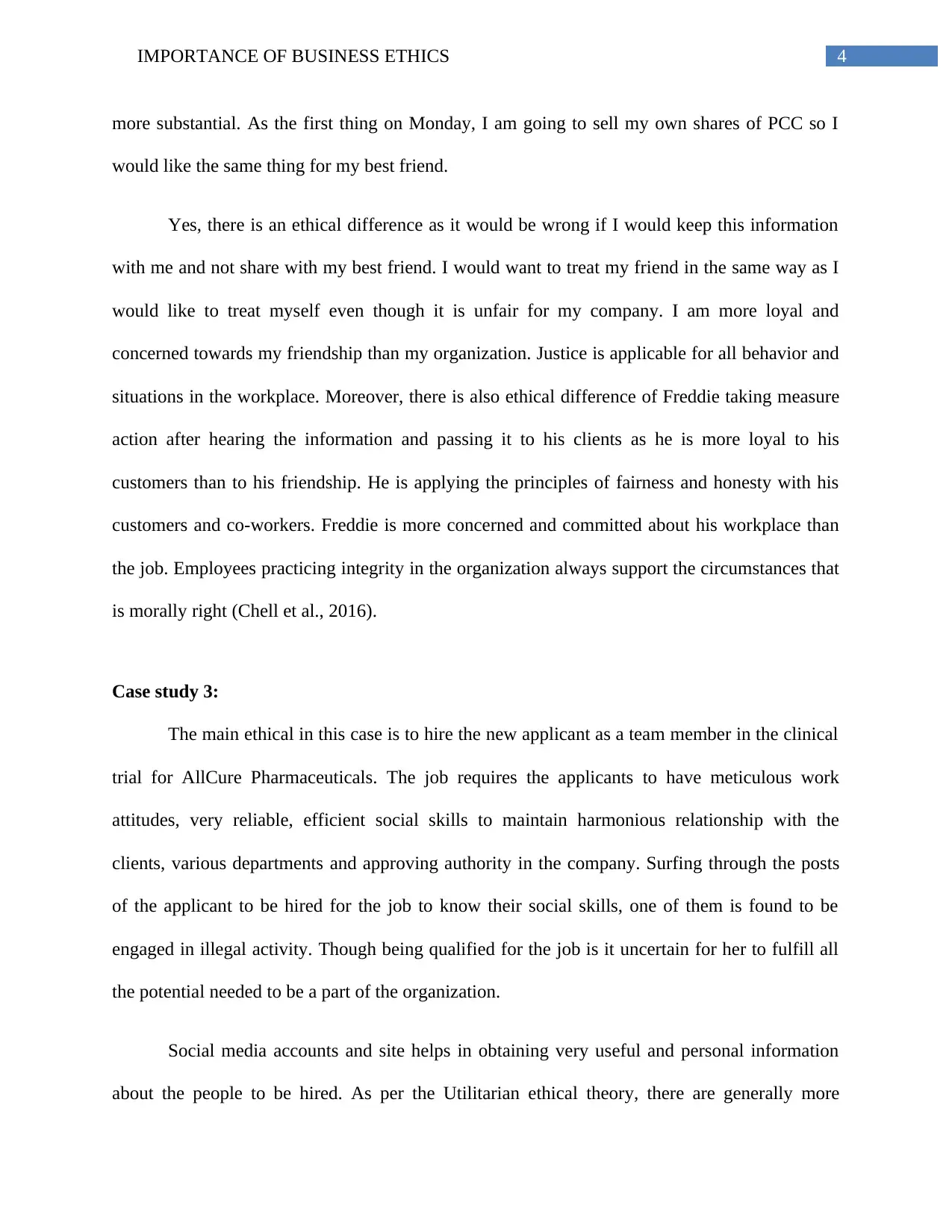
4IMPORTANCE OF BUSINESS ETHICS
more substantial. As the first thing on Monday, I am going to sell my own shares of PCC so I
would like the same thing for my best friend.
Yes, there is an ethical difference as it would be wrong if I would keep this information
with me and not share with my best friend. I would want to treat my friend in the same way as I
would like to treat myself even though it is unfair for my company. I am more loyal and
concerned towards my friendship than my organization. Justice is applicable for all behavior and
situations in the workplace. Moreover, there is also ethical difference of Freddie taking measure
action after hearing the information and passing it to his clients as he is more loyal to his
customers than to his friendship. He is applying the principles of fairness and honesty with his
customers and co-workers. Freddie is more concerned and committed about his workplace than
the job. Employees practicing integrity in the organization always support the circumstances that
is morally right (Chell et al., 2016).
Case study 3:
The main ethical in this case is to hire the new applicant as a team member in the clinical
trial for AllCure Pharmaceuticals. The job requires the applicants to have meticulous work
attitudes, very reliable, efficient social skills to maintain harmonious relationship with the
clients, various departments and approving authority in the company. Surfing through the posts
of the applicant to be hired for the job to know their social skills, one of them is found to be
engaged in illegal activity. Though being qualified for the job is it uncertain for her to fulfill all
the potential needed to be a part of the organization.
Social media accounts and site helps in obtaining very useful and personal information
about the people to be hired. As per the Utilitarian ethical theory, there are generally more
more substantial. As the first thing on Monday, I am going to sell my own shares of PCC so I
would like the same thing for my best friend.
Yes, there is an ethical difference as it would be wrong if I would keep this information
with me and not share with my best friend. I would want to treat my friend in the same way as I
would like to treat myself even though it is unfair for my company. I am more loyal and
concerned towards my friendship than my organization. Justice is applicable for all behavior and
situations in the workplace. Moreover, there is also ethical difference of Freddie taking measure
action after hearing the information and passing it to his clients as he is more loyal to his
customers than to his friendship. He is applying the principles of fairness and honesty with his
customers and co-workers. Freddie is more concerned and committed about his workplace than
the job. Employees practicing integrity in the organization always support the circumstances that
is morally right (Chell et al., 2016).
Case study 3:
The main ethical in this case is to hire the new applicant as a team member in the clinical
trial for AllCure Pharmaceuticals. The job requires the applicants to have meticulous work
attitudes, very reliable, efficient social skills to maintain harmonious relationship with the
clients, various departments and approving authority in the company. Surfing through the posts
of the applicant to be hired for the job to know their social skills, one of them is found to be
engaged in illegal activity. Though being qualified for the job is it uncertain for her to fulfill all
the potential needed to be a part of the organization.
Social media accounts and site helps in obtaining very useful and personal information
about the people to be hired. As per the Utilitarian ethical theory, there are generally more
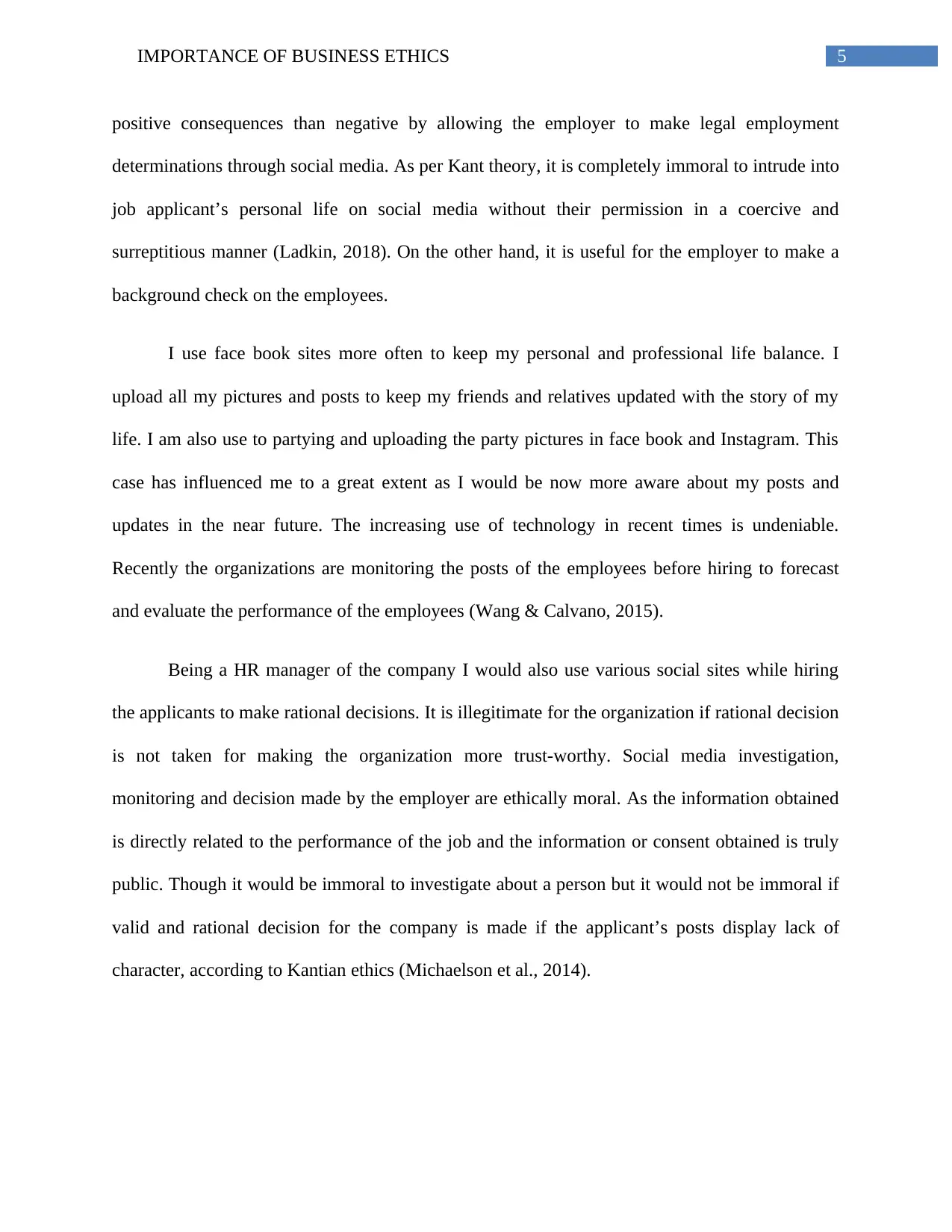
5IMPORTANCE OF BUSINESS ETHICS
positive consequences than negative by allowing the employer to make legal employment
determinations through social media. As per Kant theory, it is completely immoral to intrude into
job applicant’s personal life on social media without their permission in a coercive and
surreptitious manner (Ladkin, 2018). On the other hand, it is useful for the employer to make a
background check on the employees.
I use face book sites more often to keep my personal and professional life balance. I
upload all my pictures and posts to keep my friends and relatives updated with the story of my
life. I am also use to partying and uploading the party pictures in face book and Instagram. This
case has influenced me to a great extent as I would be now more aware about my posts and
updates in the near future. The increasing use of technology in recent times is undeniable.
Recently the organizations are monitoring the posts of the employees before hiring to forecast
and evaluate the performance of the employees (Wang & Calvano, 2015).
Being a HR manager of the company I would also use various social sites while hiring
the applicants to make rational decisions. It is illegitimate for the organization if rational decision
is not taken for making the organization more trust-worthy. Social media investigation,
monitoring and decision made by the employer are ethically moral. As the information obtained
is directly related to the performance of the job and the information or consent obtained is truly
public. Though it would be immoral to investigate about a person but it would not be immoral if
valid and rational decision for the company is made if the applicant’s posts display lack of
character, according to Kantian ethics (Michaelson et al., 2014).
positive consequences than negative by allowing the employer to make legal employment
determinations through social media. As per Kant theory, it is completely immoral to intrude into
job applicant’s personal life on social media without their permission in a coercive and
surreptitious manner (Ladkin, 2018). On the other hand, it is useful for the employer to make a
background check on the employees.
I use face book sites more often to keep my personal and professional life balance. I
upload all my pictures and posts to keep my friends and relatives updated with the story of my
life. I am also use to partying and uploading the party pictures in face book and Instagram. This
case has influenced me to a great extent as I would be now more aware about my posts and
updates in the near future. The increasing use of technology in recent times is undeniable.
Recently the organizations are monitoring the posts of the employees before hiring to forecast
and evaluate the performance of the employees (Wang & Calvano, 2015).
Being a HR manager of the company I would also use various social sites while hiring
the applicants to make rational decisions. It is illegitimate for the organization if rational decision
is not taken for making the organization more trust-worthy. Social media investigation,
monitoring and decision made by the employer are ethically moral. As the information obtained
is directly related to the performance of the job and the information or consent obtained is truly
public. Though it would be immoral to investigate about a person but it would not be immoral if
valid and rational decision for the company is made if the applicant’s posts display lack of
character, according to Kantian ethics (Michaelson et al., 2014).
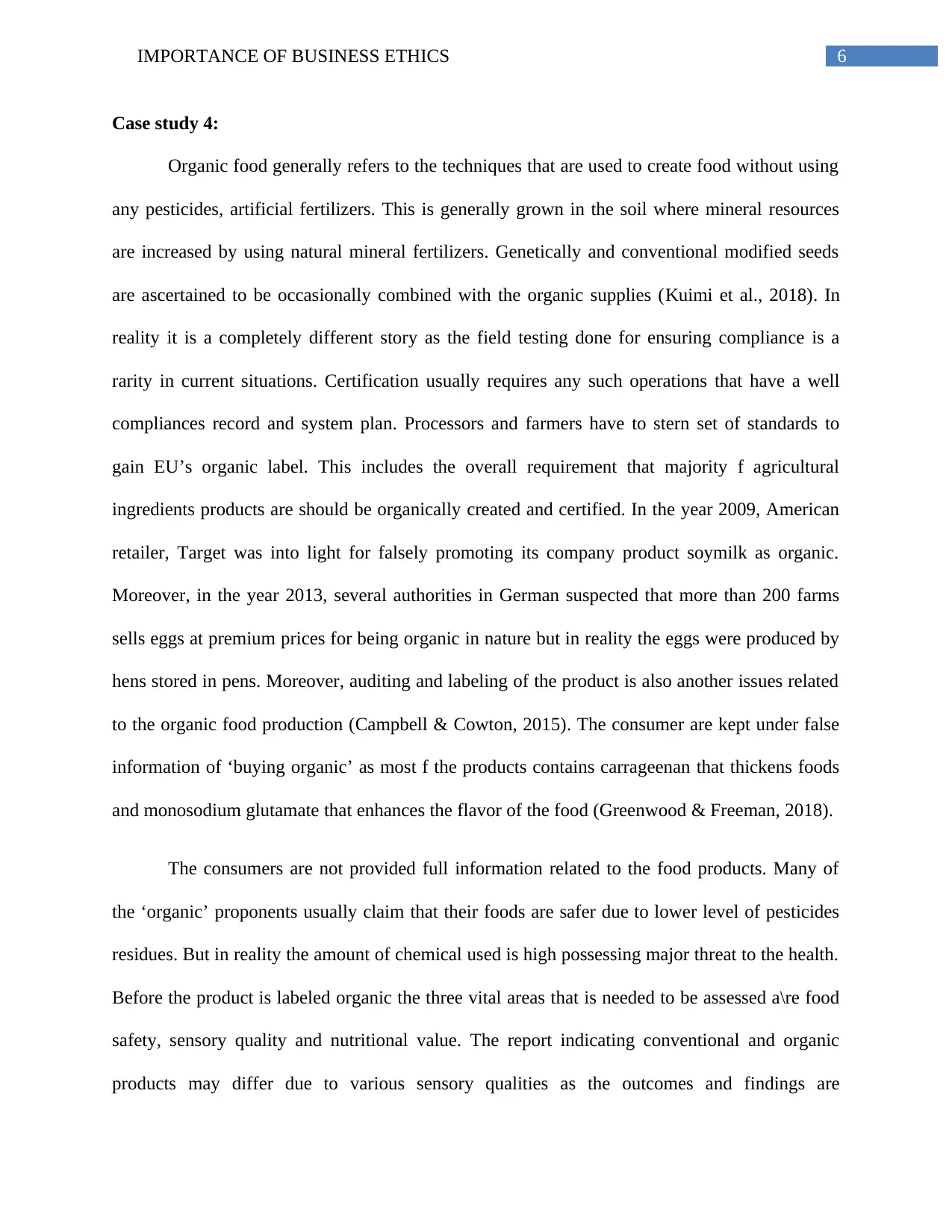
6IMPORTANCE OF BUSINESS ETHICS
Case study 4:
Organic food generally refers to the techniques that are used to create food without using
any pesticides, artificial fertilizers. This is generally grown in the soil where mineral resources
are increased by using natural mineral fertilizers. Genetically and conventional modified seeds
are ascertained to be occasionally combined with the organic supplies (Kuimi et al., 2018). In
reality it is a completely different story as the field testing done for ensuring compliance is a
rarity in current situations. Certification usually requires any such operations that have a well
compliances record and system plan. Processors and farmers have to stern set of standards to
gain EU’s organic label. This includes the overall requirement that majority f agricultural
ingredients products are should be organically created and certified. In the year 2009, American
retailer, Target was into light for falsely promoting its company product soymilk as organic.
Moreover, in the year 2013, several authorities in German suspected that more than 200 farms
sells eggs at premium prices for being organic in nature but in reality the eggs were produced by
hens stored in pens. Moreover, auditing and labeling of the product is also another issues related
to the organic food production (Campbell & Cowton, 2015). The consumer are kept under false
information of ‘buying organic’ as most f the products contains carrageenan that thickens foods
and monosodium glutamate that enhances the flavor of the food (Greenwood & Freeman, 2018).
The consumers are not provided full information related to the food products. Many of
the ‘organic’ proponents usually claim that their foods are safer due to lower level of pesticides
residues. But in reality the amount of chemical used is high possessing major threat to the health.
Before the product is labeled organic the three vital areas that is needed to be assessed a\re food
safety, sensory quality and nutritional value. The report indicating conventional and organic
products may differ due to various sensory qualities as the outcomes and findings are
Case study 4:
Organic food generally refers to the techniques that are used to create food without using
any pesticides, artificial fertilizers. This is generally grown in the soil where mineral resources
are increased by using natural mineral fertilizers. Genetically and conventional modified seeds
are ascertained to be occasionally combined with the organic supplies (Kuimi et al., 2018). In
reality it is a completely different story as the field testing done for ensuring compliance is a
rarity in current situations. Certification usually requires any such operations that have a well
compliances record and system plan. Processors and farmers have to stern set of standards to
gain EU’s organic label. This includes the overall requirement that majority f agricultural
ingredients products are should be organically created and certified. In the year 2009, American
retailer, Target was into light for falsely promoting its company product soymilk as organic.
Moreover, in the year 2013, several authorities in German suspected that more than 200 farms
sells eggs at premium prices for being organic in nature but in reality the eggs were produced by
hens stored in pens. Moreover, auditing and labeling of the product is also another issues related
to the organic food production (Campbell & Cowton, 2015). The consumer are kept under false
information of ‘buying organic’ as most f the products contains carrageenan that thickens foods
and monosodium glutamate that enhances the flavor of the food (Greenwood & Freeman, 2018).
The consumers are not provided full information related to the food products. Many of
the ‘organic’ proponents usually claim that their foods are safer due to lower level of pesticides
residues. But in reality the amount of chemical used is high possessing major threat to the health.
Before the product is labeled organic the three vital areas that is needed to be assessed a\re food
safety, sensory quality and nutritional value. The report indicating conventional and organic
products may differ due to various sensory qualities as the outcomes and findings are
Secure Best Marks with AI Grader
Need help grading? Try our AI Grader for instant feedback on your assignments.
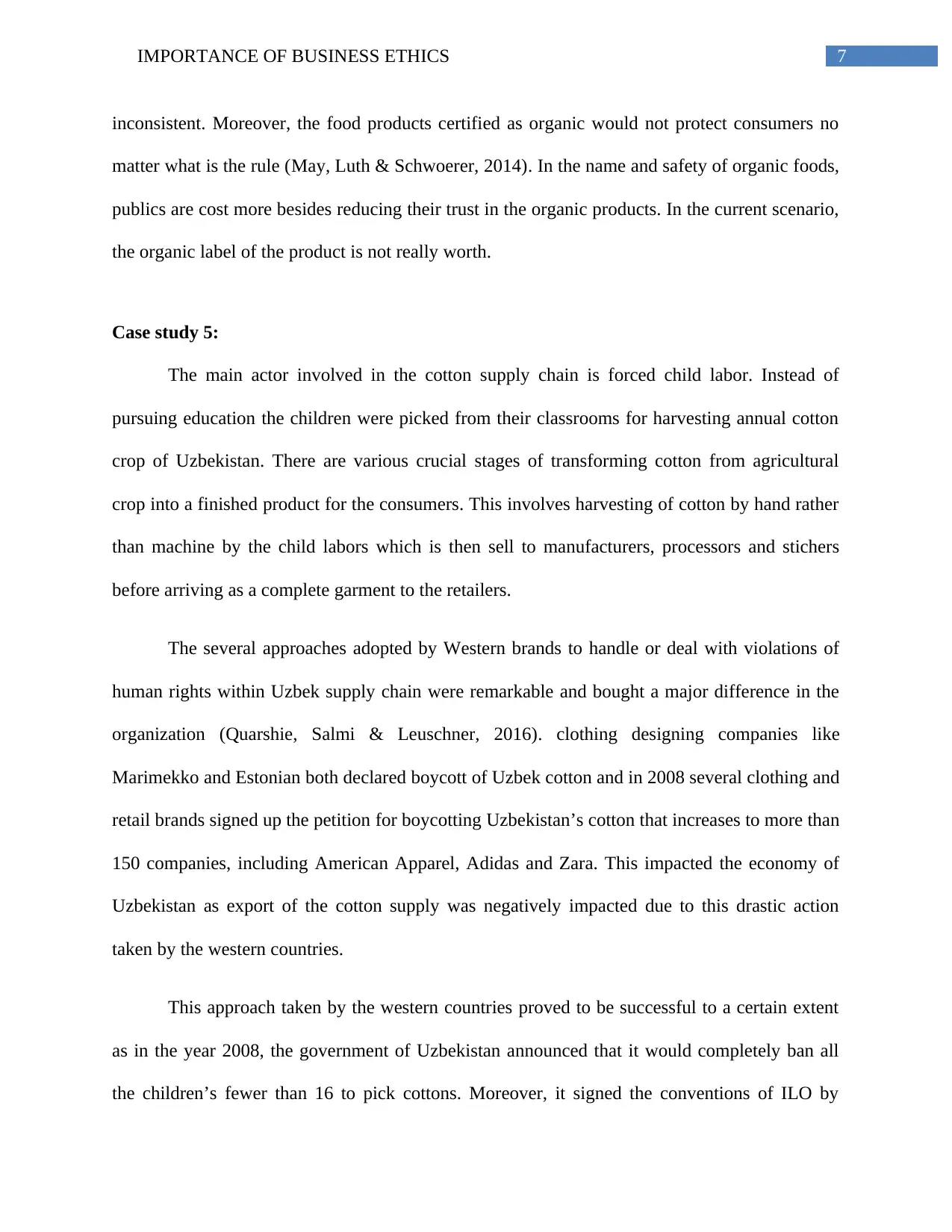
7IMPORTANCE OF BUSINESS ETHICS
inconsistent. Moreover, the food products certified as organic would not protect consumers no
matter what is the rule (May, Luth & Schwoerer, 2014). In the name and safety of organic foods,
publics are cost more besides reducing their trust in the organic products. In the current scenario,
the organic label of the product is not really worth.
Case study 5:
The main actor involved in the cotton supply chain is forced child labor. Instead of
pursuing education the children were picked from their classrooms for harvesting annual cotton
crop of Uzbekistan. There are various crucial stages of transforming cotton from agricultural
crop into a finished product for the consumers. This involves harvesting of cotton by hand rather
than machine by the child labors which is then sell to manufacturers, processors and stichers
before arriving as a complete garment to the retailers.
The several approaches adopted by Western brands to handle or deal with violations of
human rights within Uzbek supply chain were remarkable and bought a major difference in the
organization (Quarshie, Salmi & Leuschner, 2016). clothing designing companies like
Marimekko and Estonian both declared boycott of Uzbek cotton and in 2008 several clothing and
retail brands signed up the petition for boycotting Uzbekistan’s cotton that increases to more than
150 companies, including American Apparel, Adidas and Zara. This impacted the economy of
Uzbekistan as export of the cotton supply was negatively impacted due to this drastic action
taken by the western countries.
This approach taken by the western countries proved to be successful to a certain extent
as in the year 2008, the government of Uzbekistan announced that it would completely ban all
the children’s fewer than 16 to pick cottons. Moreover, it signed the conventions of ILO by
inconsistent. Moreover, the food products certified as organic would not protect consumers no
matter what is the rule (May, Luth & Schwoerer, 2014). In the name and safety of organic foods,
publics are cost more besides reducing their trust in the organic products. In the current scenario,
the organic label of the product is not really worth.
Case study 5:
The main actor involved in the cotton supply chain is forced child labor. Instead of
pursuing education the children were picked from their classrooms for harvesting annual cotton
crop of Uzbekistan. There are various crucial stages of transforming cotton from agricultural
crop into a finished product for the consumers. This involves harvesting of cotton by hand rather
than machine by the child labors which is then sell to manufacturers, processors and stichers
before arriving as a complete garment to the retailers.
The several approaches adopted by Western brands to handle or deal with violations of
human rights within Uzbek supply chain were remarkable and bought a major difference in the
organization (Quarshie, Salmi & Leuschner, 2016). clothing designing companies like
Marimekko and Estonian both declared boycott of Uzbek cotton and in 2008 several clothing and
retail brands signed up the petition for boycotting Uzbekistan’s cotton that increases to more than
150 companies, including American Apparel, Adidas and Zara. This impacted the economy of
Uzbekistan as export of the cotton supply was negatively impacted due to this drastic action
taken by the western countries.
This approach taken by the western countries proved to be successful to a certain extent
as in the year 2008, the government of Uzbekistan announced that it would completely ban all
the children’s fewer than 16 to pick cottons. Moreover, it signed the conventions of ILO by
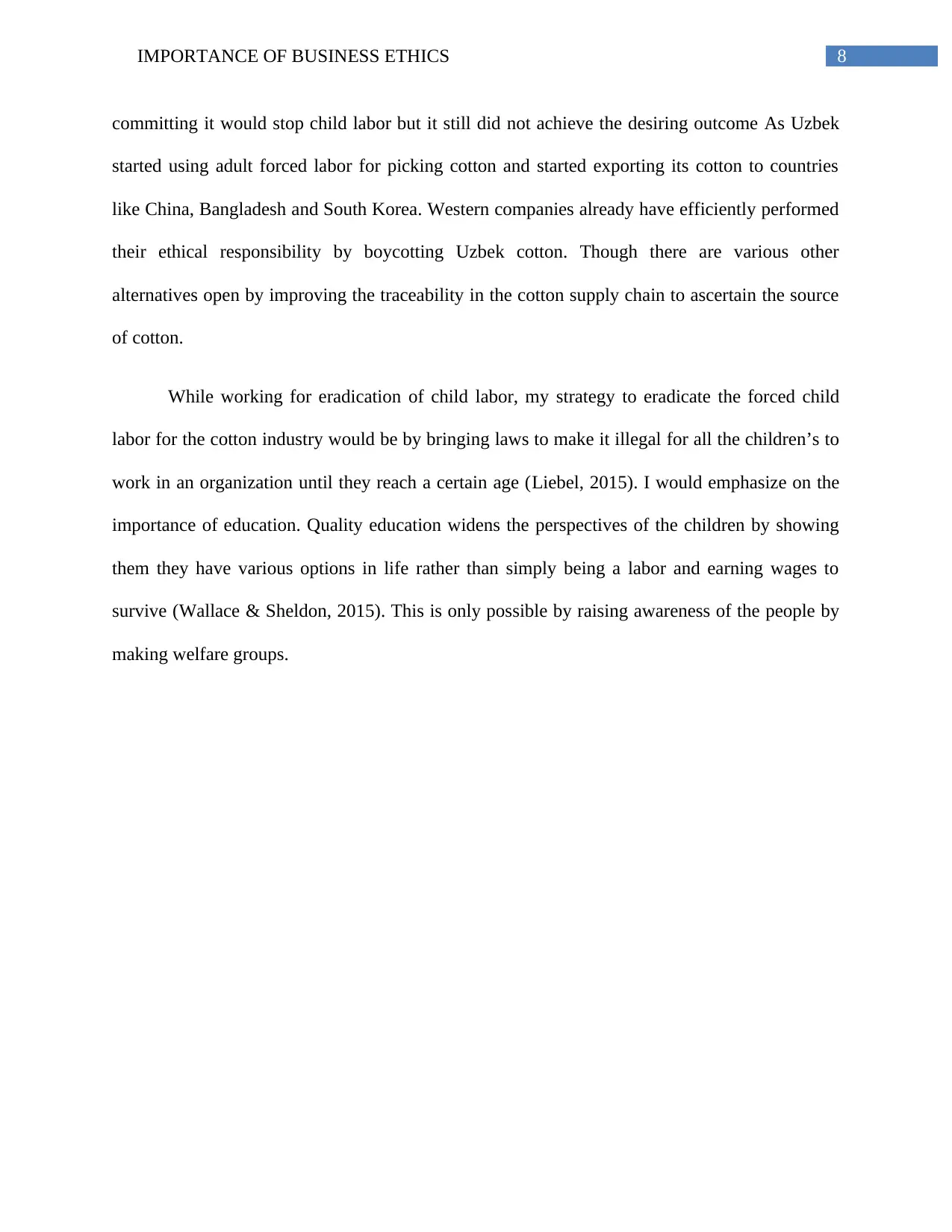
8IMPORTANCE OF BUSINESS ETHICS
committing it would stop child labor but it still did not achieve the desiring outcome As Uzbek
started using adult forced labor for picking cotton and started exporting its cotton to countries
like China, Bangladesh and South Korea. Western companies already have efficiently performed
their ethical responsibility by boycotting Uzbek cotton. Though there are various other
alternatives open by improving the traceability in the cotton supply chain to ascertain the source
of cotton.
While working for eradication of child labor, my strategy to eradicate the forced child
labor for the cotton industry would be by bringing laws to make it illegal for all the children’s to
work in an organization until they reach a certain age (Liebel, 2015). I would emphasize on the
importance of education. Quality education widens the perspectives of the children by showing
them they have various options in life rather than simply being a labor and earning wages to
survive (Wallace & Sheldon, 2015). This is only possible by raising awareness of the people by
making welfare groups.
committing it would stop child labor but it still did not achieve the desiring outcome As Uzbek
started using adult forced labor for picking cotton and started exporting its cotton to countries
like China, Bangladesh and South Korea. Western companies already have efficiently performed
their ethical responsibility by boycotting Uzbek cotton. Though there are various other
alternatives open by improving the traceability in the cotton supply chain to ascertain the source
of cotton.
While working for eradication of child labor, my strategy to eradicate the forced child
labor for the cotton industry would be by bringing laws to make it illegal for all the children’s to
work in an organization until they reach a certain age (Liebel, 2015). I would emphasize on the
importance of education. Quality education widens the perspectives of the children by showing
them they have various options in life rather than simply being a labor and earning wages to
survive (Wallace & Sheldon, 2015). This is only possible by raising awareness of the people by
making welfare groups.
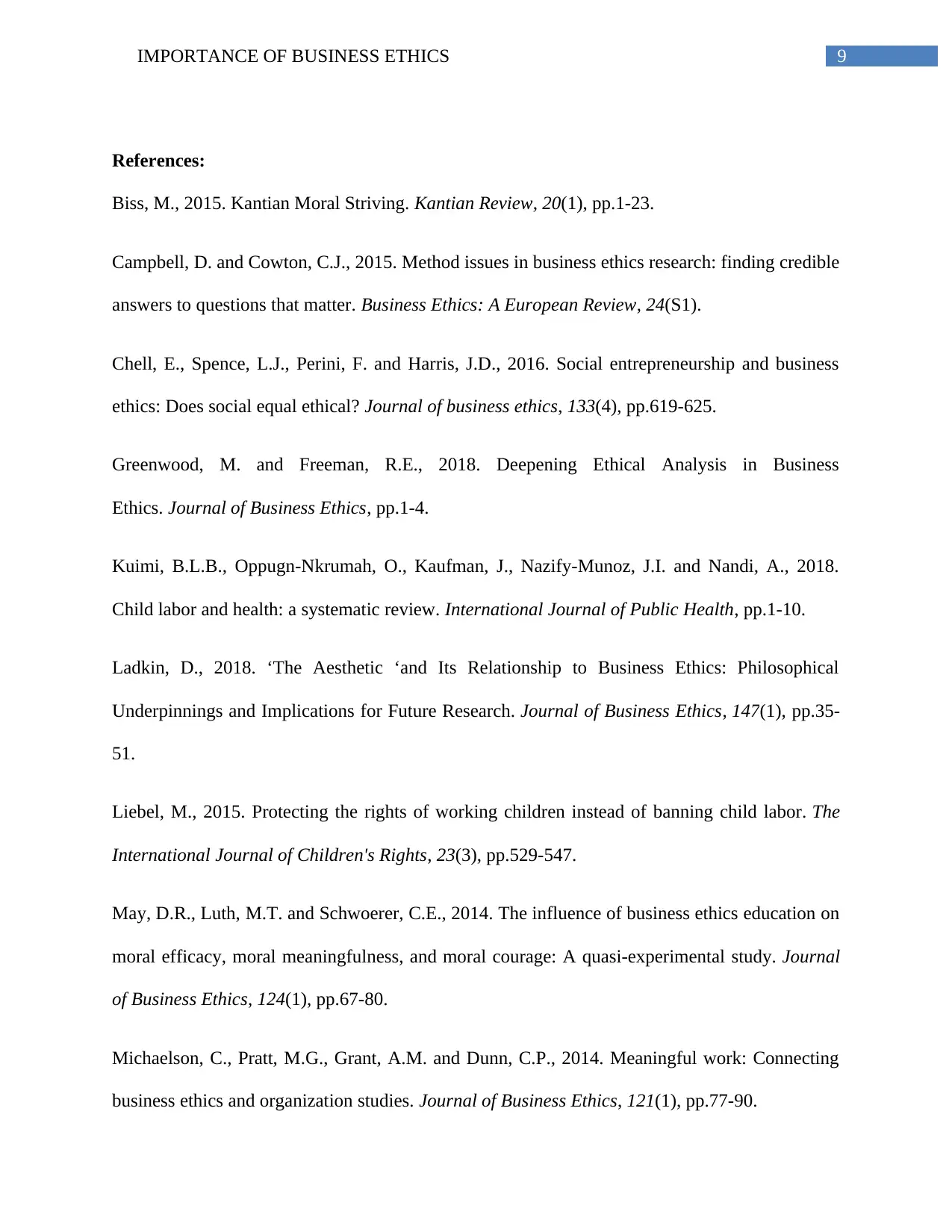
9IMPORTANCE OF BUSINESS ETHICS
References:
Biss, M., 2015. Kantian Moral Striving. Kantian Review, 20(1), pp.1-23.
Campbell, D. and Cowton, C.J., 2015. Method issues in business ethics research: finding credible
answers to questions that matter. Business Ethics: A European Review, 24(S1).
Chell, E., Spence, L.J., Perini, F. and Harris, J.D., 2016. Social entrepreneurship and business
ethics: Does social equal ethical? Journal of business ethics, 133(4), pp.619-625.
Greenwood, M. and Freeman, R.E., 2018. Deepening Ethical Analysis in Business
Ethics. Journal of Business Ethics, pp.1-4.
Kuimi, B.L.B., Oppugn-Nkrumah, O., Kaufman, J., Nazify-Munoz, J.I. and Nandi, A., 2018.
Child labor and health: a systematic review. International Journal of Public Health, pp.1-10.
Ladkin, D., 2018. ‘The Aesthetic ‘and Its Relationship to Business Ethics: Philosophical
Underpinnings and Implications for Future Research. Journal of Business Ethics, 147(1), pp.35-
51.
Liebel, M., 2015. Protecting the rights of working children instead of banning child labor. The
International Journal of Children's Rights, 23(3), pp.529-547.
May, D.R., Luth, M.T. and Schwoerer, C.E., 2014. The influence of business ethics education on
moral efficacy, moral meaningfulness, and moral courage: A quasi-experimental study. Journal
of Business Ethics, 124(1), pp.67-80.
Michaelson, C., Pratt, M.G., Grant, A.M. and Dunn, C.P., 2014. Meaningful work: Connecting
business ethics and organization studies. Journal of Business Ethics, 121(1), pp.77-90.
References:
Biss, M., 2015. Kantian Moral Striving. Kantian Review, 20(1), pp.1-23.
Campbell, D. and Cowton, C.J., 2015. Method issues in business ethics research: finding credible
answers to questions that matter. Business Ethics: A European Review, 24(S1).
Chell, E., Spence, L.J., Perini, F. and Harris, J.D., 2016. Social entrepreneurship and business
ethics: Does social equal ethical? Journal of business ethics, 133(4), pp.619-625.
Greenwood, M. and Freeman, R.E., 2018. Deepening Ethical Analysis in Business
Ethics. Journal of Business Ethics, pp.1-4.
Kuimi, B.L.B., Oppugn-Nkrumah, O., Kaufman, J., Nazify-Munoz, J.I. and Nandi, A., 2018.
Child labor and health: a systematic review. International Journal of Public Health, pp.1-10.
Ladkin, D., 2018. ‘The Aesthetic ‘and Its Relationship to Business Ethics: Philosophical
Underpinnings and Implications for Future Research. Journal of Business Ethics, 147(1), pp.35-
51.
Liebel, M., 2015. Protecting the rights of working children instead of banning child labor. The
International Journal of Children's Rights, 23(3), pp.529-547.
May, D.R., Luth, M.T. and Schwoerer, C.E., 2014. The influence of business ethics education on
moral efficacy, moral meaningfulness, and moral courage: A quasi-experimental study. Journal
of Business Ethics, 124(1), pp.67-80.
Michaelson, C., Pratt, M.G., Grant, A.M. and Dunn, C.P., 2014. Meaningful work: Connecting
business ethics and organization studies. Journal of Business Ethics, 121(1), pp.77-90.
Paraphrase This Document
Need a fresh take? Get an instant paraphrase of this document with our AI Paraphraser
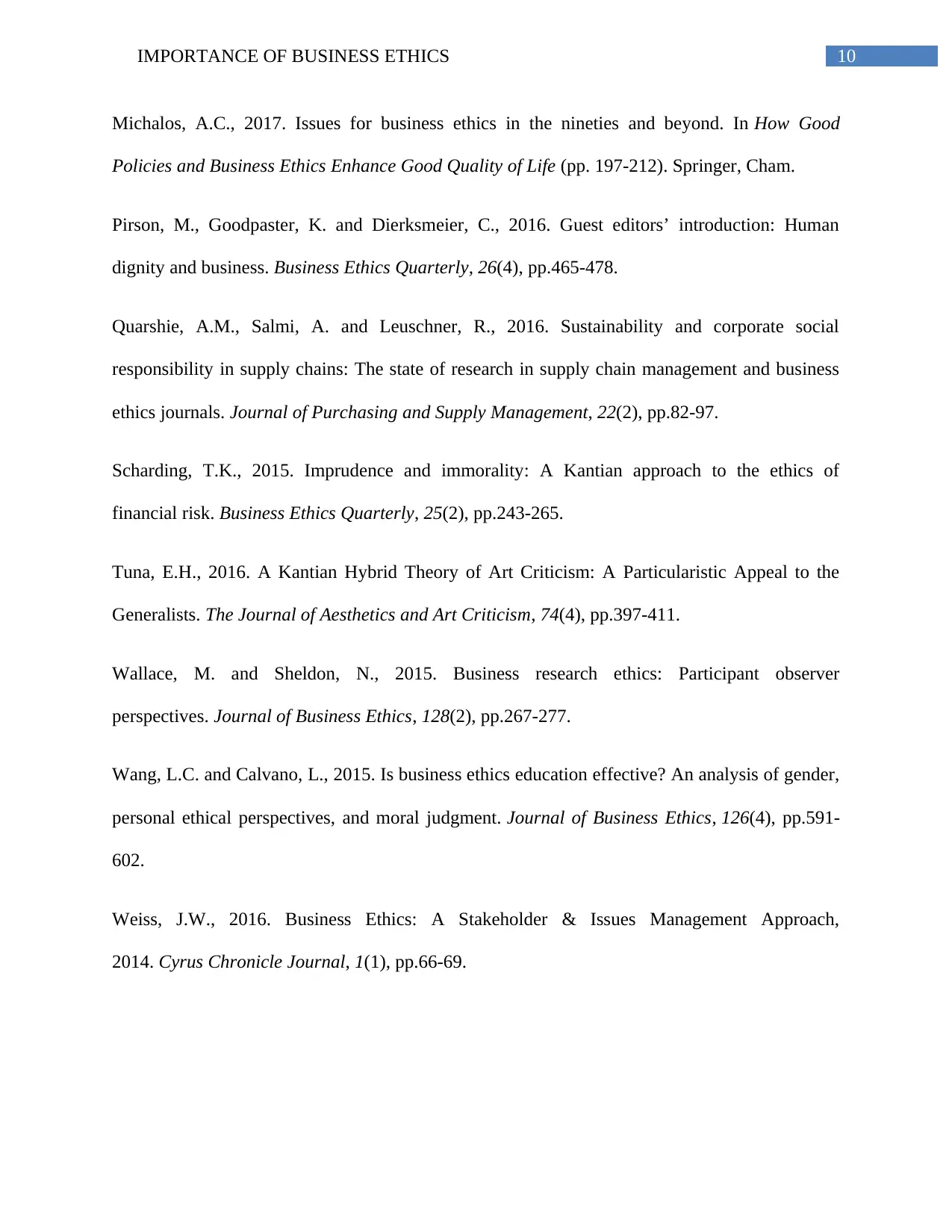
10IMPORTANCE OF BUSINESS ETHICS
Michalos, A.C., 2017. Issues for business ethics in the nineties and beyond. In How Good
Policies and Business Ethics Enhance Good Quality of Life (pp. 197-212). Springer, Cham.
Pirson, M., Goodpaster, K. and Dierksmeier, C., 2016. Guest editors’ introduction: Human
dignity and business. Business Ethics Quarterly, 26(4), pp.465-478.
Quarshie, A.M., Salmi, A. and Leuschner, R., 2016. Sustainability and corporate social
responsibility in supply chains: The state of research in supply chain management and business
ethics journals. Journal of Purchasing and Supply Management, 22(2), pp.82-97.
Scharding, T.K., 2015. Imprudence and immorality: A Kantian approach to the ethics of
financial risk. Business Ethics Quarterly, 25(2), pp.243-265.
Tuna, E.H., 2016. A Kantian Hybrid Theory of Art Criticism: A Particularistic Appeal to the
Generalists. The Journal of Aesthetics and Art Criticism, 74(4), pp.397-411.
Wallace, M. and Sheldon, N., 2015. Business research ethics: Participant observer
perspectives. Journal of Business Ethics, 128(2), pp.267-277.
Wang, L.C. and Calvano, L., 2015. Is business ethics education effective? An analysis of gender,
personal ethical perspectives, and moral judgment. Journal of Business Ethics, 126(4), pp.591-
602.
Weiss, J.W., 2016. Business Ethics: A Stakeholder & Issues Management Approach,
2014. Cyrus Chronicle Journal, 1(1), pp.66-69.
Michalos, A.C., 2017. Issues for business ethics in the nineties and beyond. In How Good
Policies and Business Ethics Enhance Good Quality of Life (pp. 197-212). Springer, Cham.
Pirson, M., Goodpaster, K. and Dierksmeier, C., 2016. Guest editors’ introduction: Human
dignity and business. Business Ethics Quarterly, 26(4), pp.465-478.
Quarshie, A.M., Salmi, A. and Leuschner, R., 2016. Sustainability and corporate social
responsibility in supply chains: The state of research in supply chain management and business
ethics journals. Journal of Purchasing and Supply Management, 22(2), pp.82-97.
Scharding, T.K., 2015. Imprudence and immorality: A Kantian approach to the ethics of
financial risk. Business Ethics Quarterly, 25(2), pp.243-265.
Tuna, E.H., 2016. A Kantian Hybrid Theory of Art Criticism: A Particularistic Appeal to the
Generalists. The Journal of Aesthetics and Art Criticism, 74(4), pp.397-411.
Wallace, M. and Sheldon, N., 2015. Business research ethics: Participant observer
perspectives. Journal of Business Ethics, 128(2), pp.267-277.
Wang, L.C. and Calvano, L., 2015. Is business ethics education effective? An analysis of gender,
personal ethical perspectives, and moral judgment. Journal of Business Ethics, 126(4), pp.591-
602.
Weiss, J.W., 2016. Business Ethics: A Stakeholder & Issues Management Approach,
2014. Cyrus Chronicle Journal, 1(1), pp.66-69.
1 out of 11
![[object Object]](/_next/static/media/star-bottom.7253800d.svg)





